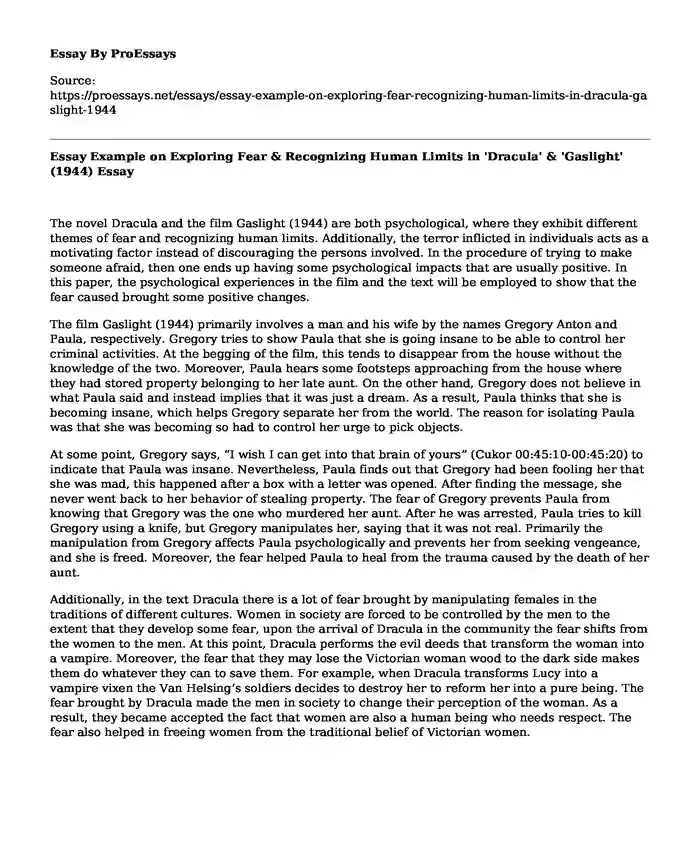The novel Dracula and the film Gaslight (1944) are both psychological, where they exhibit different themes of fear and recognizing human limits. Additionally, the terror inflicted in individuals acts as a motivating factor instead of discouraging the persons involved. In the procedure of trying to make someone afraid, then one ends up having some psychological impacts that are usually positive. In this paper, the psychological experiences in the film and the text will be employed to show that the fear caused brought some positive changes.
The film Gaslight (1944) primarily involves a man and his wife by the names Gregory Anton and Paula, respectively. Gregory tries to show Paula that she is going insane to be able to control her criminal activities. At the begging of the film, this tends to disappear from the house without the knowledge of the two. Moreover, Paula hears some footsteps approaching from the house where they had stored property belonging to her late aunt. On the other hand, Gregory does not believe in what Paula said and instead implies that it was just a dream. As a result, Paula thinks that she is becoming insane, which helps Gregory separate her from the world. The reason for isolating Paula was that she was becoming so had to control her urge to pick objects.
At some point, Gregory says, “I wish I can get into that brain of yours” (Cukor 00:45:10-00:45:20) to indicate that Paula was insane. Nevertheless, Paula finds out that Gregory had been fooling her that she was mad, this happened after a box with a letter was opened. After finding the message, she never went back to her behavior of stealing property. The fear of Gregory prevents Paula from knowing that Gregory was the one who murdered her aunt. After he was arrested, Paula tries to kill Gregory using a knife, but Gregory manipulates her, saying that it was not real. Primarily the manipulation from Gregory affects Paula psychologically and prevents her from seeking vengeance, and she is freed. Moreover, the fear helped Paula to heal from the trauma caused by the death of her aunt.
Additionally, in the text Dracula there is a lot of fear brought by manipulating females in the traditions of different cultures. Women in society are forced to be controlled by the men to the extent that they develop some fear, upon the arrival of Dracula in the community the fear shifts from the women to the men. At this point, Dracula performs the evil deeds that transform the woman into a vampire. Moreover, the fear that they may lose the Victorian woman wood to the dark side makes them do whatever they can to save them. For example, when Dracula transforms Lucy into a vampire vixen the Van Helsing’s soldiers decides to destroy her to reform her into a pure being. The fear brought by Dracula made the men in society to change their perception of the woman. As a result, they became accepted the fact that women are also a human being who needs respect. The fear also helped in freeing women from the traditional belief of Victorian women.
Conclusion
In conclusion, the fear that one faces may have psychological impacts that help change the characters of an individual. As evident in both scenarios, people are changing for the better due to fear. Women were also freed from the Victorian culture were they were not treated ethically.
Cite this page
Essay Example on Exploring Fear & Recognizing Human Limits in 'Dracula' & 'Gaslight' (1944). (2023, Sep 15). Retrieved from https://proessays.net/essays/essay-example-on-exploring-fear-recognizing-human-limits-in-dracula-gaslight-1944
If you are the original author of this essay and no longer wish to have it published on the ProEssays website, please click below to request its removal:
- Dementia Prevention Among the Elderly Paper Example
- Interview to Nurture the Potential of the Aging Interviewee Paper Example
- Essay Sample on Social Comparison on Facebook: Effects and Impact
- Background Information on Suits: Mike, Harvey, and Other Relevant Characters
- Instagram: Enhancing Communication & Marketing With Social Media - Research Paper
- The Power of Leadership: Impacting Followers and Organizations - Essay Sample
- Community Resilience - Essay Sample







